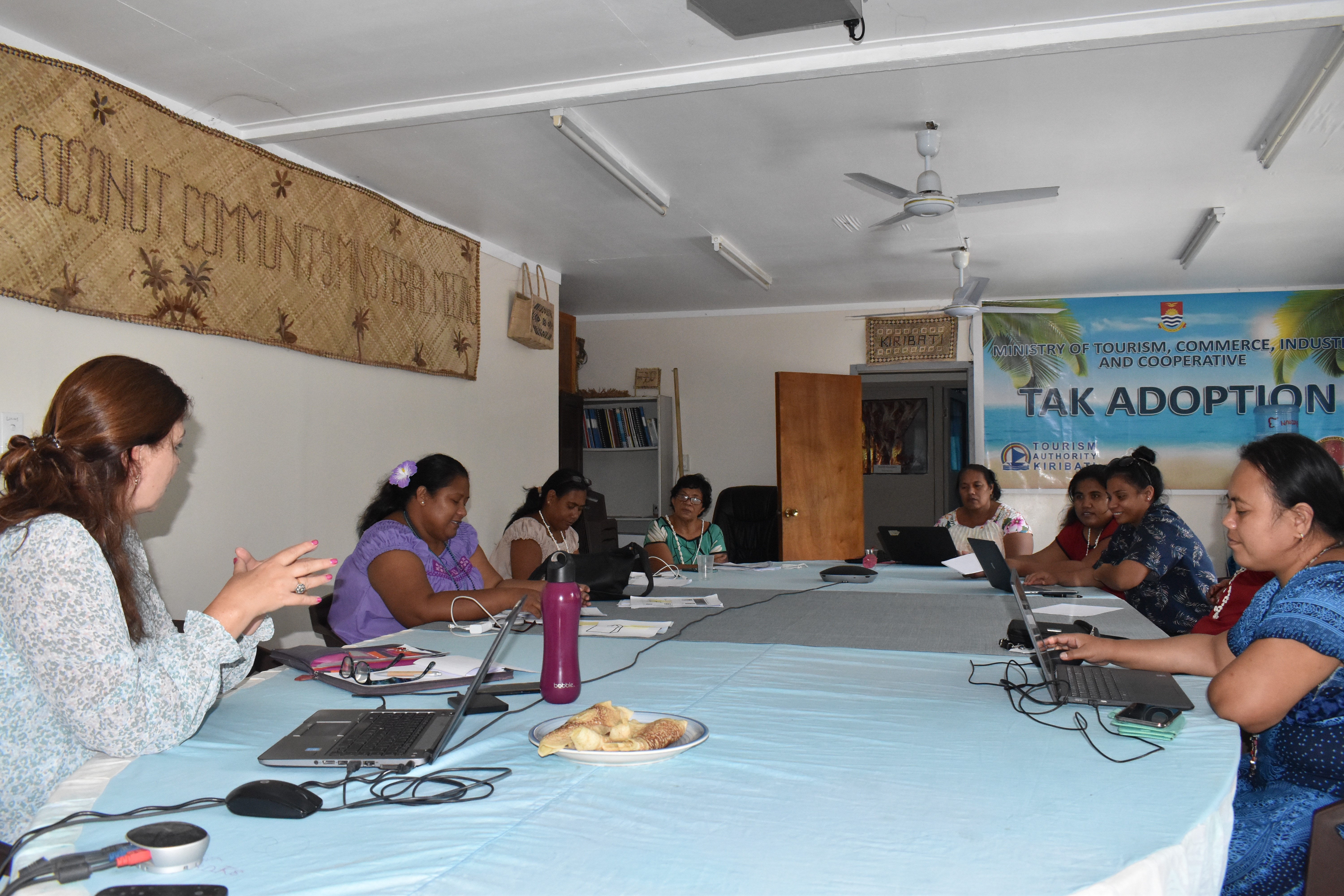Author: Diana van Dorresteijn Consultant - Kiribati Cooperative Legislative Framework Review, UNDP Pacific Office in Fiji
Building a Sustainable Future Together: Kiribati’s Journey with Cooperatives
August 14, 2023
In the enchanting Pacific nation of Kiribati, an inspiring and groundbreaking initiative is underway to empower local communities and ensure a brighter, sustainable future for its people. The United Nations Pacific Strategy (UNPS) 2023-2027 supports this journey, uniting 14 Pacific Island states and their people in pursuit of the global 2030 Agenda for Sustainable Development.
Cooperatives, with their people-centric approach, play a vital role in addressing local needs and contributing to each country's national priorities.
Jointly led by Kiribati's Ministry of Tourism, Commerce, Industry, and Cooperatives (MTCIC) and the United Nations Development Programme (UNDP), the development of a new Cooperative Policy and Cooperative Bill in the summer of 2022 lay the foundation for effective, equitable, and inclusive policies inspired by successful practices across various regions.
The overarching goal of the policy is to strengthen the cooperative movement’s leadership, enabling it to eradicate poverty, create jobs, and bring about socio-economic transformation in Kiribati. The new cooperative bill and the policy recommendations mark significant steps towards establishing a supportive legal and institutional framework to foster cooperative development in Kiribati. The newly proposed bill guarantees cooperative rights, fosters education, and streamlines access to financing and markets.
Increased cooperative development and cooperation between cooperatives and government bodies is aimed at improving fundamental service delivery, such as waste management, under the policy. Cooperatives and governments can more effectively serve the needs of the community by combining their individual skills and resources. The new cooperative bill acknowledges and protects cooperative rights, promotes cooperative education and training programs, and attempts to make access to financing and markets easier.
The Kiribati government (GoK) are fully committed to:
• Uphold the sanctity of cooperative principles and values as a way of safeguarding while ensuring the interests of members are safeguarded
• Enhancing the competitiveness and sustainability of cooperative societies
• Increasing the legal recognition of cooperatives as independent entities; and
• Ensuring equal treatment and opportunities for all
• The policy places a strong emphasis on social inclusion, gender equality, and the avoidance of harmful environmental repercussions.
Together, we held workshops and consultations in July 2023, involving various ministries, cooperatives, the attorney's office, police, the private sector, NGO's, youth church members, and more. Our aim was to familiarise stakeholders with the new legislation and to guide cooperative action with a focus on gender equality and social inclusion at its core.

Conducting workshops and meetings with various stakeholders in July 2023.
We also invested in extensive training for MTCIC staff to ensure a deep understanding of how to operationalize and enforce the new policy and bill. This approach accelerates community-led development by empowering resilient local organizations. As we face external challenges and increasing interdependence, resilient local institutions are essential for our collective progress.

An extensive training was conducted for the MCTC staff this year.
At the heart of cooperative models lies collaboration among community members to address economic, social, and cultural challenges collectively. These community-owned organizations promote entrepreneurship and self-sufficiency, fostering trust, mutual support, social cohesion, and inclusive development. They are more suited for collective growth, responding effectively to the needs of the members and the community they serve. Cooperatives often thrive in industries where individual small businesses may struggle. Combining resources allows them to achieve economies of scale, access markets, and negotiate better terms with suppliers and buyers.
In the Kiribati community, cooperative models allow community members to come together and address their economic, social, and cultural issues collaboratively. Owned and managed by the community, these organizations ensure that the benefits are shared among all members. Local cooperative organizations promote economic self-sufficiency and entrepreneurship, fostering cooperation, trust, mutual support, social cohesion, and inclusive development.
While cooperatives offer immense potential for sustainable development, we acknowledge that their effectiveness in Kiribati is hindered by poor governance and leadership. Although cooperatives are democratic in nature, most of the membership has not used this democracy to elect capable leaders and select competent management to ensure that cooperative principles and ambitions are realized and that cooperative regulations are followed.
To unleash the full potential of cooperatives in Kiribati, we must invest in education, training, expertise, and financial resources for the cooperative members. Strengthening human capital and providing access to modern equipment and instruments will drive our collective growth and competitiveness. Together, we must address infrastructure challenges, such as storage, transportation, power supply, and communication. A modern Cooperative Management Information System is essential for effective planning and data availability.
Despite the immense potential, the effectiveness of cooperatives in Kiribati is challenged by governance and leadership issues. More emphasis on education, expertise, and member involvement is needed to ensure cooperative principles are upheld and cooperative regulations followed. To overcome obstacles, cooperative members need support in acquiring the necessary skills, access to financing, and modern equipment. Investment is vital to enhance cooperatives' contributions to Kiribati's national development strategy, uplift living conditions through job creation, and combat climate change.
Kiribati's journey with cooperatives is one of unity, community-driven progress, and sustainability, fueled by the shared dream of a better tomorrow for all.
Contact information:
Akosita Talei, Communications and Research Officer, Inclusive Growth Programme, UNDP Pacific Office in Fiji, akosita.ratumaimuri@undp.org

 Locations
Locations

